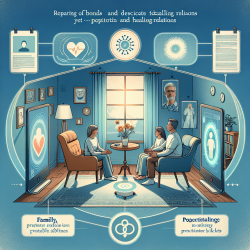The COVID-19 pandemic forced a rapid shift to online therapy, presenting both opportunities and challenges for therapists. The study titled ‘When it comes to relational trauma, you need people at the table’ by Simons et al. (2022) offers critical insights into the experiences of family therapists providing online therapy to families affected by sibling sexual abuse (SSA) during pandemic lockdowns. This blog explores how practitioners can improve their skills by implementing the outcomes of this research or by delving deeper into related studies.
In this study, Dutch family therapists working with SSA families were interviewed to understand their experiences during the sudden transition to online therapy. The thematic analysis of these interviews yielded two main findings:
- Therapists did not report acute concerns about clients' sexual safety during the lockdowns, but they were worried about the victim's ability to speak freely in the home environment.
- While online therapy enabled therapists to maintain connections with SSA families, it led to a decline in therapy quality and therapist well-being. Fundamental interventions, particularly those aimed at altering family relationships, were challenging to conduct online.
Given these findings, practitioners can take several steps to enhance their online therapy practice:
1. Ensure Safe Communication Environments
One of the primary concerns highlighted by the study was the safety of victims in expressing themselves freely during online sessions. Practitioners should prioritize creating a safe communication environment. This can be achieved by:
- Setting clear guidelines for privacy and confidentiality at the beginning of therapy.
- Using secure, encrypted communication platforms.
- Encouraging clients to find a private, quiet space for their sessions.
2. Enhance Therapist Well-being
The study found that therapists experienced a decline in their well-being due to the challenges of online therapy. To mitigate this, practitioners should:
- Engage in regular self-care practices, such as mindfulness and exercise.
- Seek peer support and supervision to discuss challenges and share strategies.
- Set boundaries to prevent burnout, such as limiting the number of back-to-back sessions.
3. Adapt Therapeutic Interventions
The shift to online therapy necessitates adapting traditional therapeutic interventions. Practitioners can improve the effectiveness of their interventions by:
- Utilizing digital tools and resources to facilitate engagement and interaction.
- Incorporating creative techniques, such as virtual role-playing or using visual aids.
- Regularly evaluating and adjusting the therapy approach based on client feedback and outcomes.
4. Engage in Continuous Professional Development
To stay updated with best practices and emerging research, practitioners should engage in continuous professional development. This can include:
- Attending webinars and workshops focused on online therapy and trauma-informed care.
- Reading relevant research articles and integrating new findings into practice.
- Participating in professional networks and forums to share experiences and learn from peers.
Implementing these strategies can help practitioners navigate the complexities of online therapy and improve outcomes for families affected by relational trauma. For those interested in further research, the study by Simons et al. (2022) provides a comprehensive overview of the challenges and opportunities in this field.
To read the original research paper, please follow this link: When it comes to relational trauma, you need people at the table.










